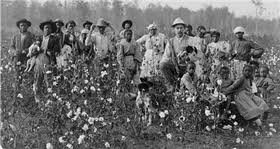Africans in America is a history that is traced back to the 16th century. Many of the African American people in America are descendants of the people from Central and West Africa who had been enslaved by white farmers in America. The black people were forcibly taken as slaves and put to work in the farms and homes of the white people.
They were treated as inferior human beings. However many revolutions that occurred years later would liberate the black people from slavery. The first people who advocated for slavery were the Spanish who took black people from their colonies to work on their farms. The white men from Britain would follow suit and publicize the free labor they had found. This led to a growth in slave trade (Davidson Stevens 34).
With an increase in the demand for slaves many began being shipped to North America. This occurred between the 1600s and 1700 when there was a great demand. The slaves provided labor in the farms, mines and houses. Many people supported slavery while a few were against it.
The slaves were denied all the rights of a human being and would be treated as property. In the 1600s there was formation of companies that traded slaves (Davidson Stevens 34). The companies formed captured slaves in Africa. These slaves were bought by the settlers. There was an increase in the demand for free labor among the settlers in North America which led to an increase in the demand for slaves. The slaves were also forced to remain in slavery by the laws that had been created in America.
Slavery was most common in Virginia and the colonies in the south. This is attributed to the fact that Virginia was the first place to receive slaves. The first black slaves were brought to Virginia and the south thus making these places a stronghold for getting slaves. Another factor that contributed to slavery in the south is the way the laws were created such that slaves would become free.
This would only occur if a slave completed their contract or if they converted to Christianity. These favorable laws would attract more slaves to the south. The second major factor for growth of slavery in the south is the increase in the plantations in the south. This increase in plantations and mines required more labor thus an increase in the number of slaves demanded (John Franklin & Alfred Moss 122).
The increase in the number of slaves in a single plantation or region resulted in formation of communities. As shown in the picture the slaves were used as dancers and formed very beautiful choirs. These were used to entertain the white masters. The slaves formed movements that would change the face of slavery. Many of the African and African American slaves would unite to form movements that would see them set free.
John Franklin & Alfred Moss explain that from the onset of slavery there was division of the white people into two factions. One was pro slavery while the other was against slavery. The people who were against slavery would unite with the slaves and provide them with means and methods for demanding equality. This was possible after the development of communities among the black people. Many of the Christians assisted in this fight against slavery (132).
Picture of black slaves working in a cotton fam

Works Cited
Davidson Stevens. A Narrative History, Volume 1: To 1865. New York: McGraw Hill, 2012. Print.
John Franklin & Alfred Moss. A History of African Americans: From Slavery to Freedom. New York: McGraw-Hill, 2001. Print.